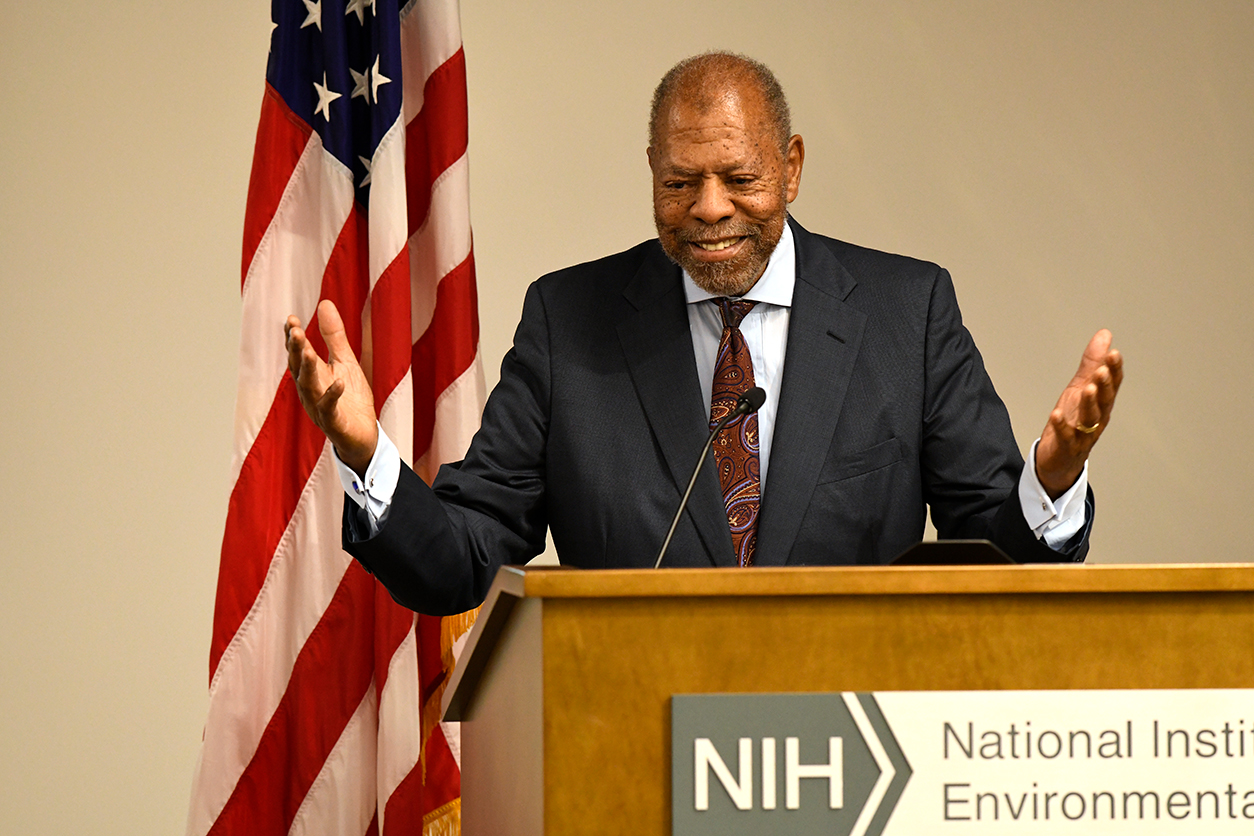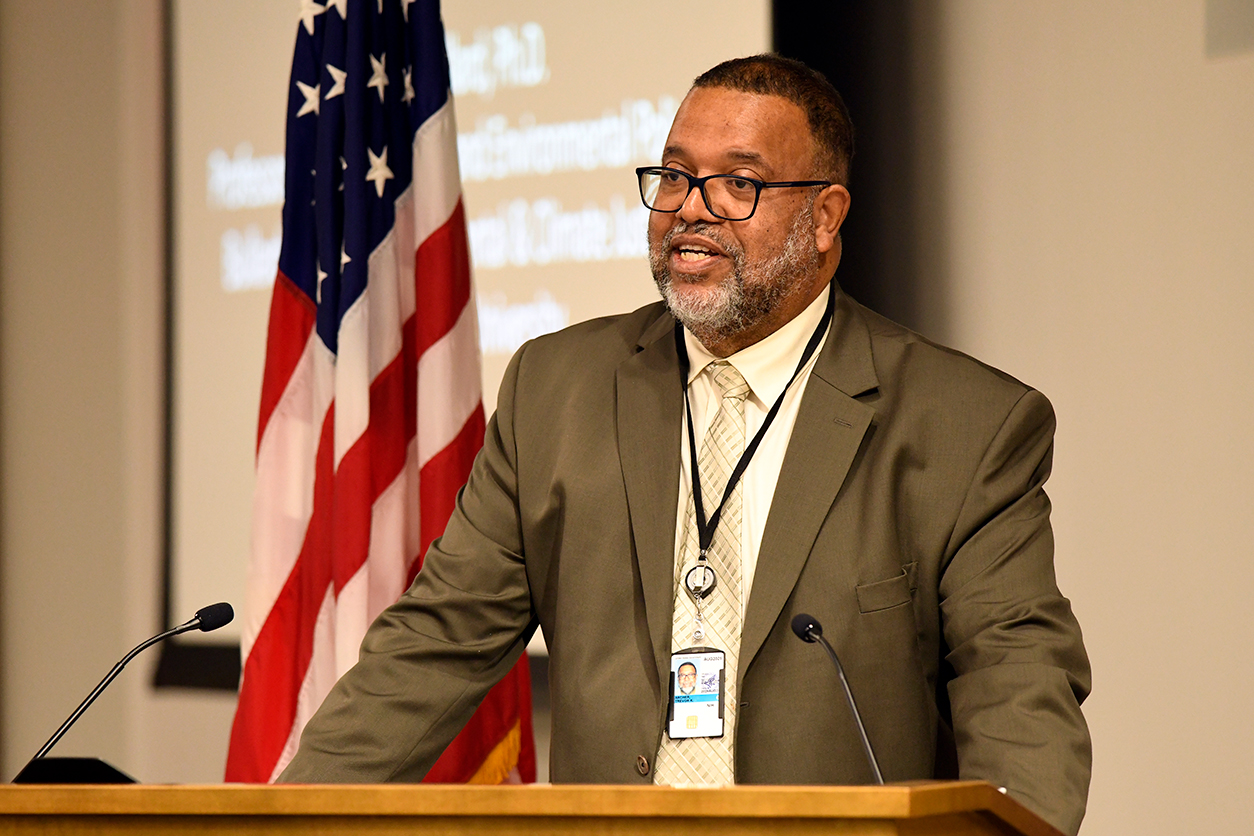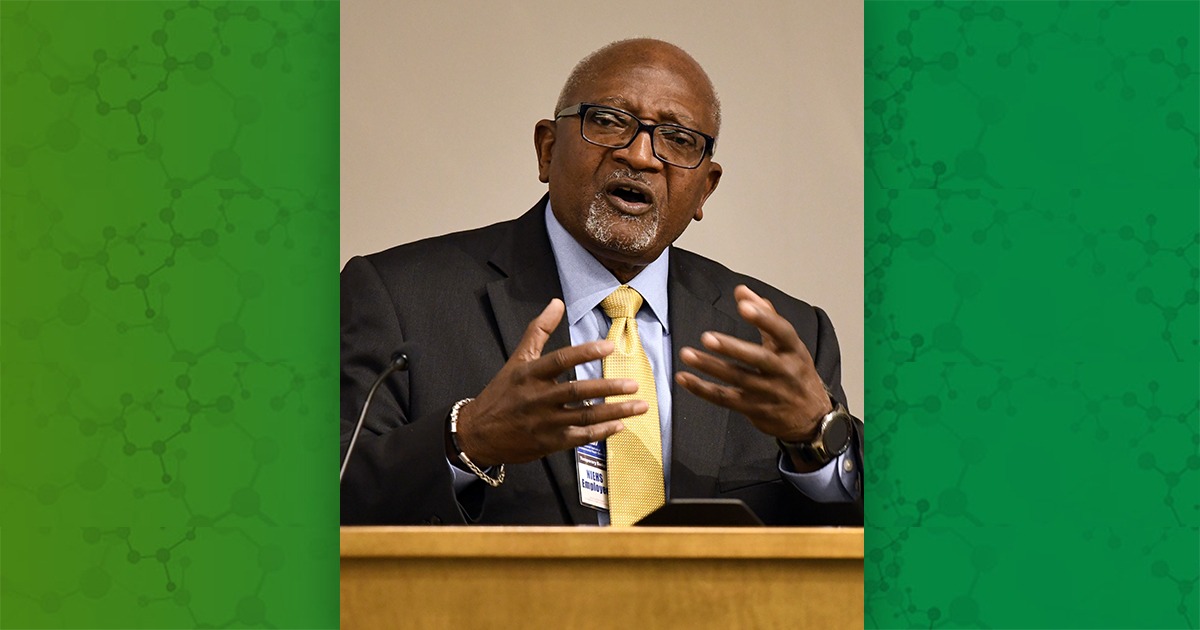The “father of environmental justice,” Robert Bullard, Ph.D., delivered the 3rd Annual NIEHS Olden Distinguished Lecture Oct. 3. He shared his more than four decades’ worth of experiences spotlighting how people of color often experience greater exposure to environmental contaminants, and he noted that such individuals are often hardest hit by climate change. Bullard pointed to practices such as racial redlining, siting polluting factories near their homes, and lack of green spaces as contributors to unhealthy and unsustainable communities.
“Environmental justice embraces the principle that all communities are entitled to equal protection of environmental, energy, health, employment, education, housing, transportation, civil, and human rights,” said Bullard, a distinguished professor at Texas Southern University, where he directs the Bullard Center for Environmental and Climate Justice. “It’s time to stand up for the American dream of justice for all.”
An advocate for communities
Bullard has published 18 books, which he jokes are really just one long book about fairness, justice, and equity — or their absence — in communities of color. One of his most famous books, Dumping in Dixie, was inspired by a lawsuit filed by Bullard’s wife in 1979.
At the time, all Houston-owned landfills — and 75% of city-owned incinerators and privately-owned landfills — were in Black neighborhoods. More than 82% of waste disposed in Houston from the 1930s to 1978 went to mostly Black neighborhoods, even though Blacks comprised only 25% of the population.
“That was my a-ha moment,” said Bullard.
“My wife, at the time, was an attorney for the community that was fighting a landfill,” he noted. “It was not a ghetto. It was a community of middle-class homeowners. Tree-lined streets, homes, and Black people. An unlikely place for a landfill.”
He tasked the class he was teaching to study where municipal trash was going — a mammoth undertaking.
“Houston is the largest American city without zoning,” Bullard told attendees. “There was no GIS [geographic information system], no Google, no iPhone. We went to the library and looked at old archival records on microfiche. We ran data on punch cards. What we found is that pollution is segregated, and so is Houston. The case lost in court, but the research born out of this supported other research in environmental justice.”
 Kenneth Olden, Ph.D., former director of NIEHS and the National Toxicology Program, shared fond memories of working with Bullard on environmental justice issues in the early 1990s. (Photo courtesy of Steve McCaw / NIEHS)
Kenneth Olden, Ph.D., former director of NIEHS and the National Toxicology Program, shared fond memories of working with Bullard on environmental justice issues in the early 1990s. (Photo courtesy of Steve McCaw / NIEHS)Injustice exacerbated by climate change
Bullard’s presentation came on the heels of Hurricane Ian, which devastated parts of Florida and, in particular, low-income and minority communities. Climate change–induced ocean warming has contributed to more powerful hurricanes, according to Bullard. He added that like pollution and waste siting, climate change will disproportionately affect those who have the most to lose.
“Climate change will hit the poorest people and regions the hardest,” Bullard said, quoting a 2017 study by researchers at the University of California, Berkeley that showed that if U.S. leaders do not adequately address climate change, the country could see a 1.2% drop in gross domestic product (GDP) at the end of the century. That drop will be felt particularly hard by the South, where up to a 20% drop in GDP is anticipated.
“The poorest region of the country can’t afford to lose that,” Bullard said. “It’s important to look at differential impacts of climate change. We must shape our policies to address the most vulnerable people and places.”
 NIEHS Deputy Director Trevor Archer, Ph.D., introduced Bullard during the hybrid event. (Photo courtesy of Steve McCaw / NIEHS)
NIEHS Deputy Director Trevor Archer, Ph.D., introduced Bullard during the hybrid event. (Photo courtesy of Steve McCaw / NIEHS)Moving beyond the status quo
He gave examples of actions policymakers could take to address inequalities: increase resilience against flooding (and help homeowners in affected areas find affordable insurance), distribute waste dumping and polluting facilities equitably across communities, and greatly increase green spaces to cool neighborhoods as temperatures rise.
Bullard also pointed out that the NIEHS Worker Training Program and the institute’s Partnerships for Environmental Public Health are critical because they empower communities to tackle challenges related to climate change and pollution.
“Your zip code is still a powerful predictor of health and wellbeing,” Bullard said. “If we can address the racial dynamics, we can address health. We need to build resilient communities and bring justice into the framework.”
(Kelley Christensen is a contract writer and editor for the NIEHS Office of Communications and Public Liaison.)
Source link
factor.niehs.nih.gov

